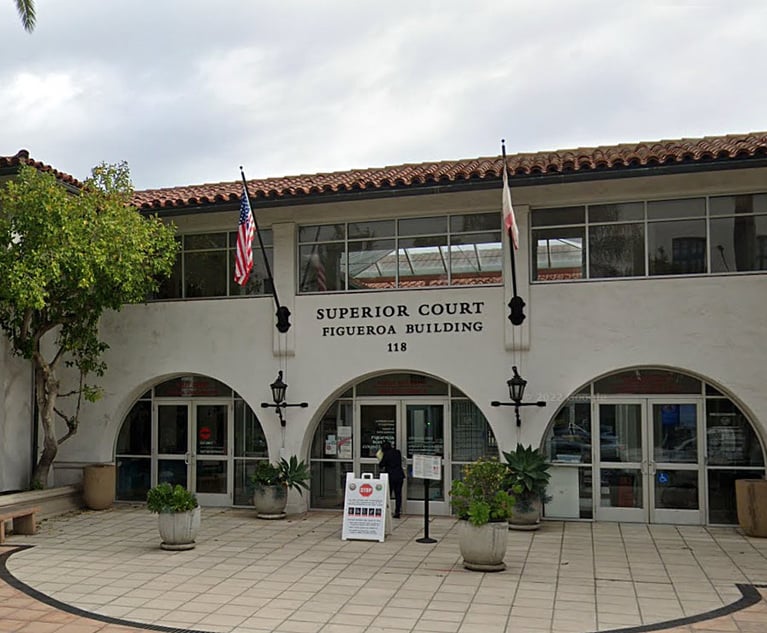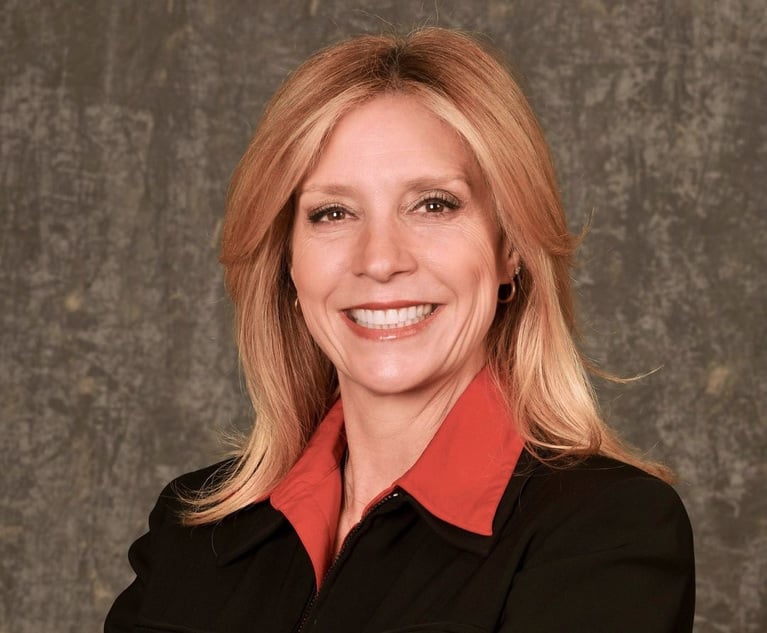 Jason Morris, a partner at Newmeyer Dillion. Courtesy photo
Jason Morris, a partner at Newmeyer Dillion. Courtesy photoWhat to Do While the Fate of AB 51—and Arbitration Agreements—Remains in Litigation Limbo
The U.S. District Court for the Eastern District of California deftly articulated employers' dilemma: "continue to utilize arbitration agreements and risk criminal and civil sanctions or avoid arbitration agreements for fear of non-compliance with a statute that is likely preempted" under the supremacy clause of the U.S. Constitution.
March 13, 2020 at 07:32 PM
6 minute read
In 2019, the California legislature passed, and Gov. Gavin Newsom signed, Assembly Bill 51 (AB 51), which by its terms prohibits employers from—and, in fact, criminalizes—requiring job applicants or employees to agree to arbitration claims under the California Fair Employment and Housing Act (FEHA) or the California Labor Code as a condition of employment.
By ratcheting up the stakes and raising the specter of criminal liability, the state of California clearly intended to have a chilling effect on employers.
That's the bad news. And now for the ray of sunlight emerging from the clouds.
In an order signed Feb. 6, the U.S. District Court for the Eastern District of California, in a case filed by the U.S. Chamber of Commerce and others challenging AB 51, issued a preliminary injunction enjoining the state of California and its agencies from enforcing the provisions of AB 51 that prohibit employers from entering into arbitration agreements with applicants and employees that are covered by (and thus preempted by) the Federal Arbitration Act (FAA).
In so doing, the district court necessarily determined that the plaintiffs are likely to prevail at trial on their claim that AB 51 is preempted by (and therefore unenforceable because of) the FAA.
Nevertheless, the fate of AB 51 isn't sealed, and AB 51 is down, but not out.
|So How Did We Get Here?
As a starting point, it has long been the case that arbitration is a favored means of dispute resolution under both federal and California law. In numerous cases, both federal and California courts have affirmed and reaffirmed the well-entrenched view that there is a strong public policy in favor of arbitration as a relatively speedy and inexpensive means of dispute resolution.
Both federal and California courts have also affirmed and reaffirmed that arbitration agreements are simply contracts that are subject to the general contract law and not a rare species of agreement that is or should be scrutinized according to a separate—and harder to meet—set of principles.
In short, arbitration is relatively quick, relatively cheap, and, for those reasons, a preferred means for resolving disputes. Moreover, arbitration agreements are merely contracts—nothing more, nothing less.
A reasonable observer might wonder, then, why the California legislature passed, and Newsom signed, AB 51 in 2019. After all, in 2019, then-Gov. Jerry Brown vetoed Assembly Bill 3080, a bill remarkably similar to AB 51.
In truth, the state of California has for years sought to limit employers' ability to enter into arbitration agreements with their employees. Despite California law that expressly grants parties the ability to enter into arbitration agreements and, indeed, affirmatively grants courts the power to compel parties into judicial arbitration in certain circumstances, the state of California has determined arbitration between employers and consenting adult employees to be so pernicious that employers should face criminal sanctions for entering into agreements that seek to resolve claims under the FEHA and the California Labor Code through arbitration.
Courts—both federal and state— have consistently rebuffed California's repeated attempts to limit such arbitration agreements in the employment context. Courts do so because they peskily insist on enforcing the supremacy clause found in Article VI of the U.S. Constitution. The nerve.
Undaunted, the state of California sought to circumnavigate this constitutional roadblock on two grounds: one, by attempting to draft AB 51 in such a way that it regulates only the formation of such agreements rather than their enforcement; and two, by providing in AB 51 that arbitration agreements covered by the FAA are not subject to its censure. The latter basis rightly struck many as peculiar as most arbitration agreements are covered by the FAA.
|What Should Employers Do While AB 51 Hangs in Litigation Limbo?
Let's start with what's clear.
First, AB 51 has no effect on arbitration agreements executed prior to Jan. 1, 2020, regardless of the outcome of the plaintiffs' case in district court. Employers may continue to enforce such arbitration agreements without fear.
Second, employers also remain free to enter into arbitration agreements that cover claims under statutes other than the FEHA and the California Labor Code. That provides some, though admittedly limited, solace as the most common employment claims in California arise out of the FEHA and the California Labor Code.
Third, employers remain free to enter into arbitration agreements that are covered by the FAA, which encompasses most arbitration agreements. Yet herein lies the risk: even a good faith, but ultimately incorrect, belief that an arbitration agreement is covered by the FAA can result in civil and criminal penalties.
The U.S. District Court for the Eastern District of California deftly articulated employers' dilemma: "continue to utilize arbitration agreements and risk criminal and civil sanctions or avoid arbitration agreements for fear of non-compliance with a statute that is likely preempted" under the supremacy clause of the U.S. Constitution. Some choice.
|How Should Employers Navigate the Dreaded Shades of Gray?
The answer, ultimately, comes down to risk tolerance because there is no clear yes or no answer.
While it seems likely the district court will eventually conclude AB 51 is preempted by the FAA and, thus, is invalid, employers that continue to require applicants and employees to sign arbitration agreements that cover claims under the FEHA and the California Labor Code are accepting risk that AB 51 ultimately survives.
Given current uncertainty, each employer must make a decision for itself, ideally in consultation with counsel, based upon a clear understanding of the law, an informed evaluation about whether its arbitration agreements are enforceable under the FAA, and the present status of litigation challenging AB 51.
Jason Morris is a partner in the Newport Beach office of Newmeyer Dillion. Morris' practice concentrates on the areas of labor and employment and business litigation. He advises employers and business owners in employment litigation, compliance, policies, investigations and contracts.
This content has been archived. It is available through our partners, LexisNexis® and Bloomberg Law.
To view this content, please continue to their sites.
Not a Lexis Subscriber?
Subscribe Now
Not a Bloomberg Law Subscriber?
Subscribe Now
NOT FOR REPRINT
© 2025 ALM Global, LLC, All Rights Reserved. Request academic re-use from www.copyright.com. All other uses, submit a request to [email protected]. For more information visit Asset & Logo Licensing.
You Might Like
View All


Santa Barbara Judge Accused of Moonlighting as Attorney for Secretary/Girlfriend
4 minute readLaw Firms Mentioned
Trending Stories
Who Got The Work
Michael G. Bongiorno, Andrew Scott Dulberg and Elizabeth E. Driscoll from Wilmer Cutler Pickering Hale and Dorr have stepped in to represent Symbotic Inc., an A.I.-enabled technology platform that focuses on increasing supply chain efficiency, and other defendants in a pending shareholder derivative lawsuit. The case, filed Oct. 2 in Massachusetts District Court by the Brown Law Firm on behalf of Stephen Austen, accuses certain officers and directors of misleading investors in regard to Symbotic's potential for margin growth by failing to disclose that the company was not equipped to timely deploy its systems or manage expenses through project delays. The case, assigned to U.S. District Judge Nathaniel M. Gorton, is 1:24-cv-12522, Austen v. Cohen et al.
Who Got The Work
Edmund Polubinski and Marie Killmond of Davis Polk & Wardwell have entered appearances for data platform software development company MongoDB and other defendants in a pending shareholder derivative lawsuit. The action, filed Oct. 7 in New York Southern District Court by the Brown Law Firm, accuses the company's directors and/or officers of falsely expressing confidence in the company’s restructuring of its sales incentive plan and downplaying the severity of decreases in its upfront commitments. The case is 1:24-cv-07594, Roy v. Ittycheria et al.
Who Got The Work
Amy O. Bruchs and Kurt F. Ellison of Michael Best & Friedrich have entered appearances for Epic Systems Corp. in a pending employment discrimination lawsuit. The suit was filed Sept. 7 in Wisconsin Western District Court by Levine Eisberner LLC and Siri & Glimstad on behalf of a project manager who claims that he was wrongfully terminated after applying for a religious exemption to the defendant's COVID-19 vaccine mandate. The case, assigned to U.S. Magistrate Judge Anita Marie Boor, is 3:24-cv-00630, Secker, Nathan v. Epic Systems Corporation.
Who Got The Work
David X. Sullivan, Thomas J. Finn and Gregory A. Hall from McCarter & English have entered appearances for Sunrun Installation Services in a pending civil rights lawsuit. The complaint was filed Sept. 4 in Connecticut District Court by attorney Robert M. Berke on behalf of former employee George Edward Steins, who was arrested and charged with employing an unregistered home improvement salesperson. The complaint alleges that had Sunrun informed the Connecticut Department of Consumer Protection that the plaintiff's employment had ended in 2017 and that he no longer held Sunrun's home improvement contractor license, he would not have been hit with charges, which were dismissed in May 2024. The case, assigned to U.S. District Judge Jeffrey A. Meyer, is 3:24-cv-01423, Steins v. Sunrun, Inc. et al.
Who Got The Work
Greenberg Traurig shareholder Joshua L. Raskin has entered an appearance for boohoo.com UK Ltd. in a pending patent infringement lawsuit. The suit, filed Sept. 3 in Texas Eastern District Court by Rozier Hardt McDonough on behalf of Alto Dynamics, asserts five patents related to an online shopping platform. The case, assigned to U.S. District Judge Rodney Gilstrap, is 2:24-cv-00719, Alto Dynamics, LLC v. boohoo.com UK Limited.
Featured Firms
Law Offices of Gary Martin Hays & Associates, P.C.
(470) 294-1674
Law Offices of Mark E. Salomone
(857) 444-6468
Smith & Hassler
(713) 739-1250







